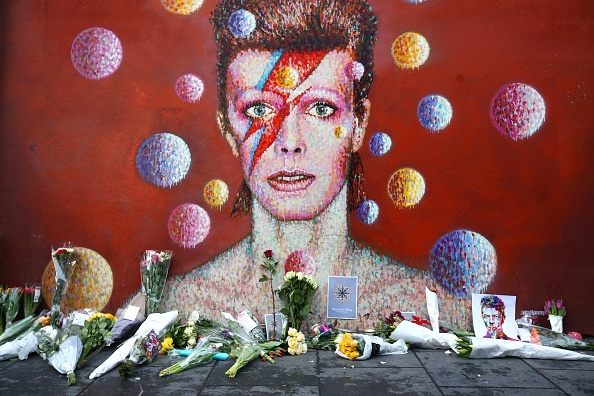You have /5 articles left.
Sign up for a free account or log in.

Memorial to David Bowie
Getty Images
There’s a special rung of hell where the serious and the damned writhe in agony, gnashing their teeth and cursing their fate, as they watch an endless marathon of historical documentaries from basic cable networks. Their lidless eyes behold Ancient Aliens, now in its tenth season, and High Hitler, which reveals that the Führer was a dope fiend. The lineup includes at least one program about the career of each and every single condemned soul in the serial-killer department, which is a few rungs down.
In the part of the inferno where I presumably have reservations, a lot of the programming concerns the history of rock music. With each cliché, a devil pokes you, just to rub it in. The monotonous predictability of each band’s narrative arc (struggle, stardom, rehab, Hall of Fame) is just part of it, since there are also the talking-head commentaries, interspersed every few minutes, by people unable to assess any aspect of the music except through hyperbole. Each singer was the voice of the era. Every notable guitarist revolutionized the way the instrument was played -- forever. No stylistic innovation failed to change the way we think about music, influencing all that followed.
Even the devils must weary of it, after a while. It probably just makes them meaner.
Here on earth, of course, such programming can be avoided. Choose to watch Nazi UFOs -- an actual program my TiVo box insists on recording every time it runs -- and you have really no one to blame but yourself.
But David Bowie’s death earlier this month left me vulnerable to the recent rerun of a program covering most of his life and work. Viewing it felt almost obligatory: I quit keeping track of Bowie’s work in the early 1980s (a pretty common tendency among early devotees, the near-consensus opinion being that he entered a long downturn in creativity around that time) so that catching up on Bowie’s last three decades, however sketchily, seemed like a matter of paying respects. It sounds like his last few albums would be worth a chance, so no regrets for watching.
Beyond that, however, the program offered only the usual insight-free superlatives -- echoes of the hype that Bowie spent much of his career both inciting and dismantling. Bowie had a precocious and intensely self-conscious relationship to mass media and spectacle. He was, in a way, Andy Warhol’s most attentive student. That could easily have led Bowie down a dead end of cynicism and stranded him there, but instead it fed a body of creative activity -- in film and theater as well as music -- that fleshed out any number of Oscar Wilde’s more challenging paradoxes. (A few that especially apply to Bowie’s career: “To be premature is to be perfect.” “One should either be a work of art or wear a work of art.” “Man is least himself when he talks in his own person. Give him a mask, and he will tell you the truth.”) There must be a whole cohort of people who lived through early theoretical discussions of postmodernism and performativity while biting our tongues, thinking that an awful lot of it was just David Bowie, minus the genius.
“Genius” can be a hype word, of course, but the biggest problem with superlatives in Bowie’s case isn’t that they are clichéd but that they’re too blunt. Claim that Bowie invented rock stardom, as somebody on TV did, for example, and the statement is historically obtuse while also somehow underestimating just how catalytic an impact he had.
As noted here in a column some months ago, Bowie is not among the artists David Shumway wrote about in Rock Star: The Making of Musical Icons from Elvis to Springsteen (Johns Hopkins University Press, 2014). And yet one aspect of Bowie’s career often taken as quintessential, his tendency to change appearances and styles, actually proves to be one of the basic characteristics of the rock star’s cultural role, well before his Thin White Duke persona rose from the ashes of Ziggy Stardust. Context undercuts the hype.
Elsewhere, in an essay for the edited collection Goth: Undead Subculture (Duke, 2007), Shumway acknowledges that Bowie did practice a kind of theatricalization that created a distinctive relationship between star and fan: the “explicit use of character, costume and makeup … moved the center of gravity from the person to the performance” in a way that seemed to abandon the rock mystique of authenticity and self-expression in favor of “disguising the self” while also reimagining it.
“His performances taught us about the constructedness of the rock star and the crafting of the rock performance,” Shumway writes. “His use of the mask revealed what Dylan’s insistence on his own authenticity and Elvis’s swagger hid.”
At the same time, Bowie’s decentered/concealed self became something audiences could and did take as a model. But rather than this being some radical innovation that transformed the way we think about rock forever (etc.), Shumway suggests that Bowie and his audience were revisiting one of the primary scenes of instruction for 20th-century culture as a whole: the cinema.
Bowie “did not appear to claim authenticity for his characters,” Shumway writes. “But screen actors do not claim authenticity for the fictional roles they play either. Because he inhabits characters, Bowie is more like a movie star than are most popular music celebrities. In both cases the issue of the star’s authenticity is not erased by the role playing, but made more complex and perhaps more intense.”
That aptly describes Bowie’s effect. He made life “more complex and perhaps more intense” -- with the sound of shattering clichés mixed into the audio track at unexpected moments. And a personal note of thanks to Shumway for breaking some, too.




